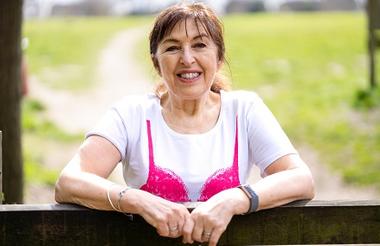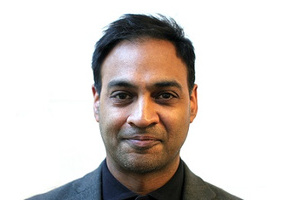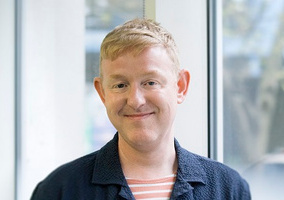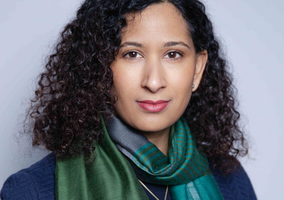Walk the Walk charity’s story began when founder Nina Barough was asleep. One night in 1996, she dreamt about power-walking the New York Marathon with some friends while wearing decorated bras to raise money for breast cancer.
Barough, who was running a styling and production business at the time, says she had no idea where the dream, which would later evolve into the MoonWalk fundraising event, came from.
“I'd never done any fundraising for anything. I didn't know anyone with breast cancer. I'd actually never done a marathon and I can absolutely tell you, never wanted to do a marathon.”
However, the idea of a weekend trip to New York appealed to Barough, and a dozen of her colleagues agreed to join her fundraising venture.
“We were a mixture of models and makeup artists and photographers and everybody from within that industry. We had a big banner, which we carried for 26 miles, swapping it every 10 minutes, and all our clients that we worked with, we persuaded them to donate £500 pounds, and we put their logo on [it].”
They ended up raising £25,000 for Breakthrough Breast Cancer (which has since merged into Breast Cancer Now), despite the charity being initially hesitant about their fundraising method.
“I think they were very excited about it but they were also quite cautious because it was so unconventional. They took it to their trustees who took a long, long time to decide whether it was something they wanted to do.
“In the end, the charity came back to us and said: ‘We're very happy for you to raise money for us.’ And of course, since then, we've gone on to raise over £30m for them, and donated towards research, so I think it was a good decision.”
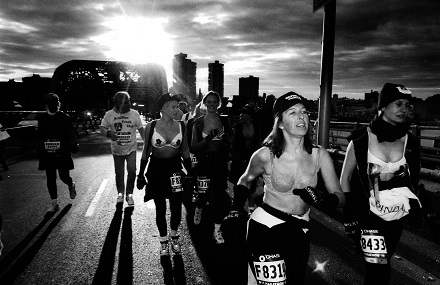
The second walk
In a cruel twist of fate, Barough was diagnosed with breast cancer a few weeks after completing the marathon.
“The actual lump was almost non-detectable. But it actually turned out to be a grade three tumour I'd probably had for about three years, and had no idea about.”
Barough says she might never have found her own lump if she had not become more aware of the possible symptoms through her fundraising for the cause. “I felt incredibly grateful,” she says.
In April 1997, a week before she underwent surgery to remove her tumour, Barough and her friends and family speed-walked another 26 miles in decorated bras, this time at the London Marathon, raising a further £25,000 for breast cancer causes.
She spent the next year undergoing treatment and had to give up the business she had led for 20 years.
In 1998, Nina entered another team for the London Marathon but only half received places. Undeterred, she created a separate one-off night-time power walking marathon, which became the first MoonWalk London.
Walk the Walk’s flagship fundraising event has continued ever since, with the 25th London challenge set to take place in 2023, while the charity has also run MoonWalks in Scotland since 2006 and Iceland from 2011.
Hands-on approach
What started as an amusing idea for a one-off fundraising event became a career change for Barough, who has been chief executive of the charity she founded since it was officially registered in 1999.
Barough is also the events director of the charity’s MoonWalks, in which she also takes part, and she still “lives and breathes” the organisation, 25 years after its formation.
She says the charity has “changed enormously” since it began and that the key to leading it over two and half decades has been to move with the times.
“For some founders, it's very hard to evolve the charity, because as it gets bigger, they very much don't know how to do that. And so, I've always been really conscious that it's really important to evolve, to keep changing, to keep being relevant.
“Everything around us has changed, but the values hold strong. And I think that's really important. Whilst I'm not Bilbo Baggins, and I won't be here till I'm 111, I hope that those values will be the thing that holds the charity going forward, and that no matter what decisions are made, there will always be a check in back to: ‘Well is that the right thing for the charity?’”
Post-pandemic recovery
The grantmaking charity has raised £137m for breast cancer causes over the past 25 years and was bringing in more than £5m a year through fundraising before the coronavirus pandemic began.
Its previous fundraising success came despite the charity not employing any professional fundraisers, relying instead on its event participants to promote the organisation’s cause and ask for donations.
Lockdown measures to control the spread of Covid-19 meant that MoonWalks could not take place for much of 2020 and 2021. The charity developed a range of virtual events, and plans to continue holding some post-pandemic, but its overall income sank to just over £1m in 2020 and recovered marginally to over £1.8m in 2021.
The charity had built up enough reserves to keep operating through the pandemic but it had to reduce its headcount by more than half.
“We cut down by about 20 people. So, we're quite a small office now. There are only about 16 of us that work. We weren't in a position to move office. We made it work so that we could work from home but I wouldn't say that would be our first choice.”
Indeed, unlike some charities, all of Walk the Walk’s remaining staff are now back in the office most of the time.
“We actually thrive, I think, on working as a team chatting across the office, ideas flowing. And you don't get that on Zoom. You don't get the fun of working as a team, that joined-up bit where fundraisers are working next to events. It's that spontaneity, which makes everything gel together. Where you get your ideas from, and where everybody gets the sort of excitement from, you just don't get that working from home,” says Barough.
The charity expects its income to recover further this year with in-person MoonWalks resuming and some virtual events continuing.
“The funds that we raise, we've just got to be really creative now about how do we do it. How do we get back to the same fundraising levels? It might have to mean that we do different things and diversify,” says Barough.
Related articles



